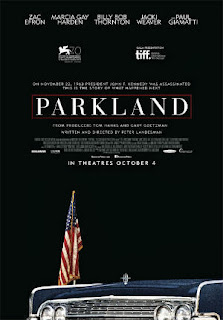 John F. Kennedy’s assassination is a moment in history
shrouded in conspiracy theories. Parkland
aims to recreate the three days – beginning with the day the President was
shot – through to the immediate aftermath and death of JFK shooter Lee Harvey
Oswald. Well-documented and thoroughly researched, Parkland is the directorial-debut of Peter Landesman - a journalist
himself seeking to ignore the myth and focus on the reality. ‘Parkland’ itself
is the hospital Kennedy died within – and where, days later, Oswald was rushed
to. Clearly capitalising on an intriguing and important story, Parkland fails to match the cinematic
scale of the event. It is held back by the safety-net of ‘accuracy’, becoming a
pedestrian and bland version of one of the most iconic time-periods in American
history.
John F. Kennedy’s assassination is a moment in history
shrouded in conspiracy theories. Parkland
aims to recreate the three days – beginning with the day the President was
shot – through to the immediate aftermath and death of JFK shooter Lee Harvey
Oswald. Well-documented and thoroughly researched, Parkland is the directorial-debut of Peter Landesman - a journalist
himself seeking to ignore the myth and focus on the reality. ‘Parkland’ itself
is the hospital Kennedy died within – and where, days later, Oswald was rushed
to. Clearly capitalising on an intriguing and important story, Parkland fails to match the cinematic
scale of the event. It is held back by the safety-net of ‘accuracy’, becoming a
pedestrian and bland version of one of the most iconic time-periods in American
history.
Told from multiple perspectives, Parkland shows us how this death immediately changed the lives of
everyone who woke-up on 22nd November 1963, excited to see the
motorcade in Dallas. Multiple doctors and nurses within Parkland hospital (Zac
Efron, Marcia Gay Harden and Colin Hanks) who desperately tried to save his
life; Mr Zapruder (Paul Giametti), capturing the infamous footage on the Dealey
Plaza; Robert Oswald (James Badge Dale), the brother of the assassin; Jim Hosty
(Ron Livingston), an FBI agent ‘tracking’ Lee Harvey Oswald and Secret Service
agent Forrest Sorrels (Billy Bob Thornton), tasked with finding evidence on the
murder itself.
Ensemble dramas lend themselves well to historical events (as
Emilo Estevez’s Bobby did in 2006, covering
the final hours of JFK’s brother, Robert Kennedy). In a post-9/11 world, an
influx of terrorist-attack film and television has shown ensemble-versions of
fictional US-tragedy ranging from televised action-series 24 through to Hollywood-trite Vantage
Point. The explosive scale of the latter suited the big-screen while Parklands reserved and thoughtful approach fails to require such
scale. Actors from 24, Band of Brothers and
The Pacific only reinforce the
televisual style of story-telling delivered. Following the shooting, Jackie
Kennedy (Kat Steffans) is covered in blood from the shooting until she boards
Air Force Once; guards have blood spattered all over their suits. It looks gruesome
and horrific, but more akin to E.R.
rather than World Trade Centre.
This begs the question whether Parklands should be a feature film at all. The tiny time-frame may
have a limited scope but the broad range of characters and the potential for
further characters (such as Oswald-killer Jack Ruby, a character Landesman
considered in early drafts of the script) surely could have suited the
much-heralded, longer-medium of the TV-series. The same stylistic 1960’s milieu
as Mad Men would gain a large
audience – especially with Tom Hanks as producer. The alternative is a
documentary, as talking heads can reflect on the event and provide further insight
into the accuracy of the reconstruction. Barry Ackroyd (of LFF Opening Gala
film Captain Phillips) is
cinematographer and his work shows-off a depth of colour that highlights the
bloody work within an A&E department in the 1960’s.
Unfortunately, the efforts to capture accuracy restrain the
director. Unlike Argo, whereby the
closing credits alone show how accurate their depiction of the 1979 Iran hostage
crisis was, Parklands weaves original
footage throughout the film itself. Conspiracy theorists will conspire. Though Parklands actively chooses not to dwell
on these ideas, a central character to sympathise or empathise with could pull
you into the story rather than split our attention. Multiple characters falling
to the floor, head in hands when the President dies (at least two) or wandering
speechless, in shock to the situation (at least another two), is inevitable and
expected – so what is Landesman adding to the story except recreating it? Those
who have accepted the non-conspiracy version of events will gain little from
seeing a recreation of a moment that has been documented so much. While Parklands may not require a
ticket-stub, it could’ve been amongst the higher-quality television – and in
fairness, that is no easy feat.
Written as coverage for The 57th London Film Festival for Flickering Myth.


No comments:
Post a Comment
Copyright 2008-2015. All posts & reviews are property of www.simoncolumb.wordpress.com/Simon Columb and should not be reproduced in whole, or in part, without express permission from the author.